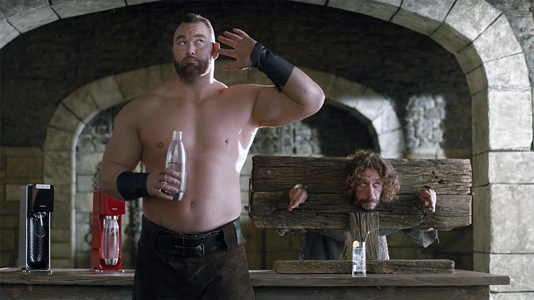SodaStream is facing a David and Goliath battle after the International Bottled Water Association (IBWA), representing brands such as Nestlé, issued a “cease and desist” in retaliation to the latest SodaStream ‘Shame or Glory’ ad featuring HBO’s “Game of Thrones” characters.
Joseph K Doss, President and General Counsel for IBWA states that SodaStream “makes false, misleading, and disparaging statements about bottled water. The IBWA strongly objects to these statements and demands that <SodaStream> immediately cease and desist showing this video”.
Doss further explains that “people should not be shamed for making healthy beverage choices and should rather be commended”. The IBWA feels it is not in the public’s interest to discourage consumption of bottled water which it feels is safer and healthier than sugary options such as soft drinks, energy drinks and juices.
SodaStream CEO Daniel Birnbaum responded with a firm statement rejecting the “gag order by the IBWA” and further committed to continue the “fight against shameful use of polluting plastic bottles”.
“We will not let the IBWA’s threats stop us from trying to save the planet,” said Birnbaum.
“The IBWA, a front for major plastic manufactures like Nestlé — the world’s largest producer of bottled water — is nothing more than an elite group of like-minded corporate sponsors who prioritize their own profits over the care of our planet. I don’t know what’s more offensive: The notion that a huge corporate organisation thinks it can silence a small company or that the message they want gagged is that plastic bottles represent a real threat to the environment“.
SodaStream’s “Shame or Glory” includes a three-minute video and an integrated social campaign. The video, which has been viewed more than 20 million times since its launch on 15 November, features a production assistant on a mission to buy sparkling water from a local supermarket. He is pursued by Hannah Waddingham as Game of Thrones character Septa Unella, who rings the bell of shame and repeatedly shouts “shame” at the assistant. When the assistant finally reaches the set, fellow Game of Thrones actor Thor Bjornsson explains the benefits of using a SodaStream machine and fresh, local tap water instead of the shameful habit of using and throwing away plastic water bottles. The refillable SodaStream carbonating cylinder makes up to 60 liters of delicious sparkling water, replacing 120 single-use plastic bottles.
More than one billion beverage bottles are used every single day around the world, the overwhelming majority of that plastic ends up in our landfills, parks and oceans.
The hazard of the plastic bottle industry to our environment is well established. The affect to marine life is particularly concerning. Since 1988, ocean conservationists have warned about the so-called “Great Pacific Garbage Patch,” a floating island the size of Texas thought to be comprised of improperly disposed plastic waste. According to a report by Greenpeace entitled “Plastic Debris in the World’s Oceans,” more than 267 different species of seabirds, turtles, seals, sea lions, whales and fish have been documented as casualties of plastic ingestion or entanglement.
In a statement issued by the Department of Environmental Affairs on World Oceans Day this year, “estimates suggesting that there are currently over 13,000 pieces of plastic litter floating on every square kilometre of ocean have been reported by UNEP in 2005. South Africa is not immune to the problem and the effects posed by marine litter.
The presence of marine litter, in particular plastic items, are a common sight along recreational beaches and estuaries, especially in urban areas. During the 2015 International Coastal Clean-up Day in East London, a total of 16 141 volunteers collected over 109 000 litter items over just 77 kilometres of coastline.
Although more people are joining hands each year to carry out coastal clean-up activities, it is clear that the amount of litter reaching the coastline and ocean environment is not declining.”

























































































